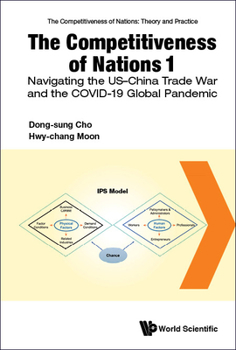Competitiveness of Nations 1, The: Navigating the Us-China Trade War and the Covid-19 Global Pandemic
In the existing reports on national competitiveness and rankings such as IMD World Competitiveness Yearbook and WEF Global Competitiveness Report, there are sizable discrepancies in the ranking order for the same countries. As a result, the reader is often confused because such an outcome creates difficulties for government officials when translating these findings into real-world policies. These discrepancies are actually due to the differences in logic and analytical models used by IMD and WEF. Therefore, in recognizing the problems and limitations of these models, this book presents the IPS model as a new approach. As an extension of Michael Porter's diamond model, it demonstrates a robust set of methodologies as well as offers a number of key policy implications for countries around the world that wish to enhance their national competitiveness.The analytical tools used in this book can be further utilized for other units of analysis such as industries and firms. As this book provides a series of sophisticated methodologies and specific guidelines for enhancing national competitiveness, both academics and practitioners can derive useful implications from this research. Alongside the theoretical frameworks and methodologies for national competitiveness presented in this book, timely topics are included such as the COVID-19 global pandemic and the US-China trade war. This book also includes various country-specific real-world cases that are assessed from the perspective of both developed and developing countries.
Format:Hardcover
Language:English
ISBN:981126113X
ISBN13:9789811261138
Release Date:May 2022
Publisher:World Scientific Publishing Company
Length:392 Pages
Weight:1.53 lbs.
Dimensions:0.9" x 6.0" x 9.0"
Related Subjects
Business Business & Investing Economics Political Science Politics & Social SciencesCustomer Reviews
0 rating





